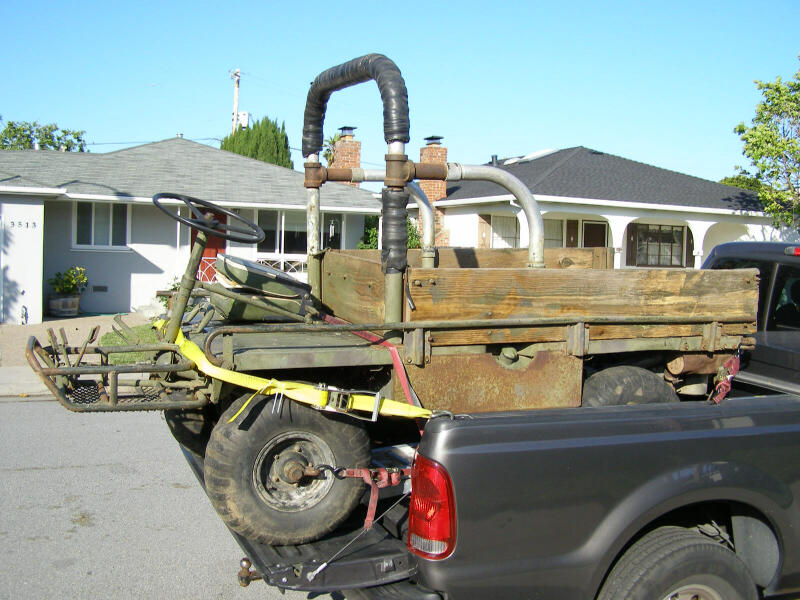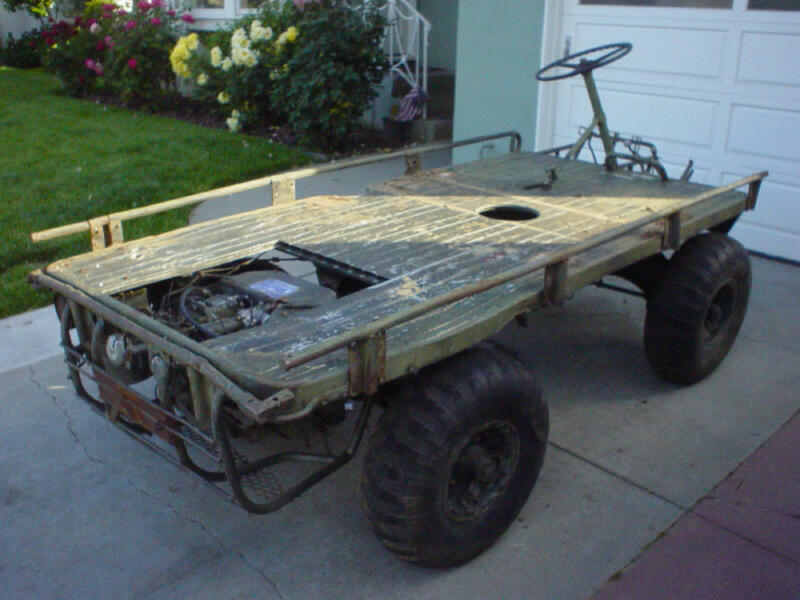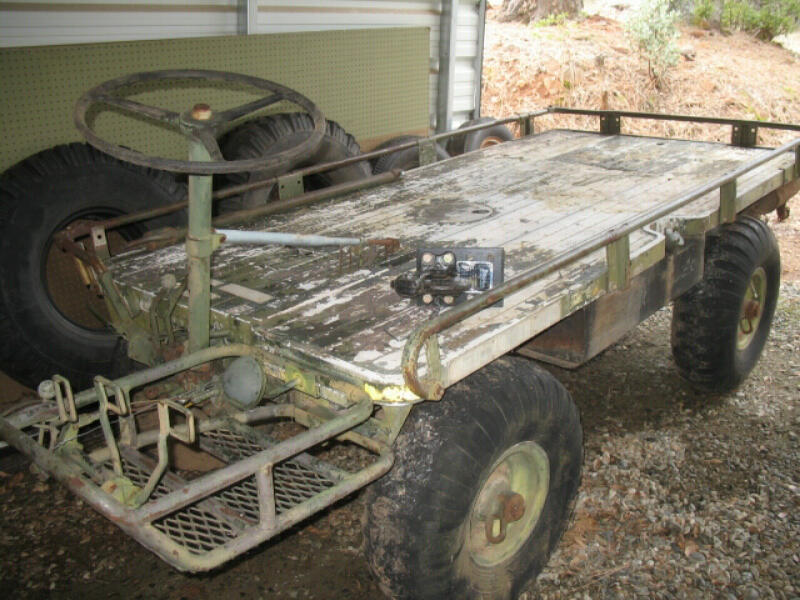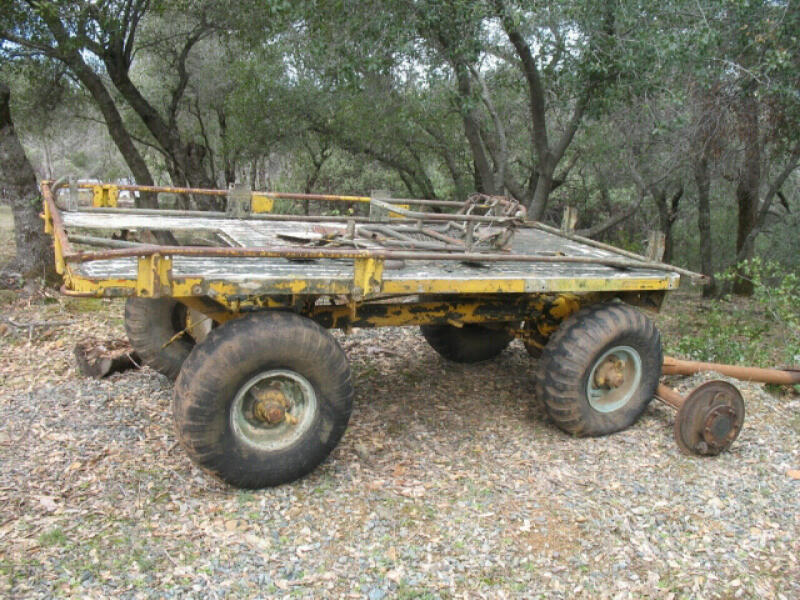M274
1969 M274A5, picked up off a ranch in Redding CA May 9, 2007
1969 M274A5, with all the farm parts removed, May 10, 2007
1966 M274A3, USMC, picked up in Chico, CA March, 7, 2009
1966 M274A3, USMC, picked up in Chico, CA March 7, 2009
M-274 Mechanical Mule
Truck, Platform, Utility ½-ton, 4x4
"THE ONLY COMBAT-PROVEN ATV"
The M274 Mechanical Mule was developed to replace both the 1/4-ton and 3/4-ton 4 X 4 vehicles in infantry and airborne infantry battalions. It needed to weigh less than 750 pounds and carry a cross-country load of 1,000 pounds plus a driver.
Willys developed a pilot model in the 1950s which could carry 850 pounds on improved roads with 2-wheel or 4-wheel drive. The driver's seat could be removed, and the steering column moved to accommodate more cargo.
Each wheel had shackles for lifting by helicopter or dropping by parachute. If it landed upside-down, it could be turned over and still be driven away.
Mules were designed to keep pace with foot soldiers, but by 1978 the Army determined that the M274 was simply too old to keep. With the HMMWV (High Mobility Multi-purpose Wheeled Vehicle) taking the place of the venerable jeep, the Mule was retired from active service.
In 2000, the value of the M274 Mule was found once again in the form of the M-Gator. The M-Gator was an off the shelf, four-wheel drive platform that serviced troops in combat as well as the M274 served thirty years before.
Very popular with both the Army and Marine Corps in Vietnam, most Mules only hauled equipment and troops.
Six varieties of Mules were made by Willys, Bowen-McLaughlin-York, Baifield Industries & Brunswick Corp.
SPECIFICATIONS:
Length: 118.25 inches
Width: 46.60 inches
Height (platform): 27.5 inches
Weight (empty): 870 pounds
Weight (loaded):
1870 poundsClearance: 12 inches
Fording depth: 18 inches
Cruising Range: 90-150 miles
Engine: Gasoline,14HP Military Standard Model A042
VARIATIONS:
4-Wheel Steering
M274 2452 built 1956-1960
M274A1 1905 built 1962-1964 4 Cylinder engine
M274A2 3609 built 1964-1967 2320-074-1167
M274A3 2320-782-5792
2-Wheel Steering
M274A4 2400 built 1965-1969 2320-930-1976
M274A5 874 built 1968-1970 2320-782-5793
Information courtesy of the US Army Transportations Museum
http://www.transchool.eustis.army.mil/museum/MECHANICALMULE.htm
The M274 is officially known as the Army Mule or Mechanical Mule. It was developed out of a requirement for an infantry ammunition, light cargo, personnel, and weapons carrier. It was adopted for service in 1957 and used with the US Army, Marine Corps, and to limited extent with the Navy, Seabees and Air Force. The first models, the M274 and the M274A1, had a four cylinder horizontally opposed, air cooled Willys engines. The later models, the M274A2, M274A3, M274A4, and M274A5 have a two cylinder, horizontally opposed air cooled military standard engine. The M274A5 has an aluminum platform while the other versions are constructed of magnesium alloy.
The M274 consists of a platform mounted on two drop axles with four wheels. The engine is rear mounted. It has no suspension system other than low pressure tires. All models are equipped with full time four-time four wheel drive, two speed transfercase, and a three forward and one reverse speed transmission. A quick change mechanism allows for either two- or four-wheel steering on the M274, A1, A2, A3, and A4 models. The mule is equipped with a cargo retaining set of rails can be raised to accommodate the payload or lowered for shipping, storage, or flat bed operations. The seat (which can be adjusted to two positions on all models except the M274 and A3) and the foot rest can be detached and stowed underneath the platform for air transport. The driver can extend the steering column brace forward to allow operation while walking or crouching in front of the vehicle. The M274A1/A2/A3/A4/A5 are equipped for slingload operations. It is designed to carry a maximum of one thousand pounds of cargo over most types of terrain, but has no published towing capability as no hitch is installed. All models of the M274 may be turned on their sides or top to ease maintenance, repair, or lubrication operations.
The first Mechanical Mules, the M274 & M274A1, had a magnesium bed and axle housings with a four cylinder engine, four wheel drive and four wheel steering. The later M274A2, A3, & A4 had a magnesium beds and axle housings, four wheel drive, four wheel steering and a two cylinder engine. The last production model, the M274A5 has an aluminium bed and axle housings, with four wheel drive and two wheel steering. Optional A5 extras include electric starters, fording kits, wide wheels and fender kits. Mules will operate over all types of road, cross-country terrain, and in all types of weather and are capable of fording in up to 18 inches of water without modification. The Mule weighs only 860 pounds and its rated load is 1000 pounds. A spare wheel/tire is not included as the mule will operate on three wheel/tires.
SPECIFICATIONS
seating....................1
length.................118.25in
configuration............4X4
width...................46.60in
towing capacity..........N/A
height: (at platform).. 27.50in
weight:
empty..........870lbs loaded.......1,870lbswheelbase..................57in
tread....................40.5in
turning radius:
two wheel steering:
left................44ft 5in
right..............38ft 0in four wheel steering:
left.............23ft 4in
right...........21ft 4inground clearance:
front...12in rear...12.5in fording depth...18incruising range:
5mph in high gear on highway.......approx. 150mi 25mph in high gear on highway......approx. 90mispeeds transmission/transfer:
3rd gear
highrange........................25mph
lowrange..........................13mph 2nd gear
highrange........................14mph
lowrange..........................7mph 1st gear
highrange.........................8mph
lowrange..........................4mphfuel consumption:
5mph in high gear on highway..........17.8mpg 25mph in high gear on highway..........8.4mpgM274 MODELS
11,240 mules were made and approximately 5,000 were destroyed or left in Vietnam.
M274 Willys-2,452 built 1956 to 1960 A04-53 engine (4 cyl)
M274-A1 Willys-1,905 built 1962 to 1964 A04-53 engine (4 cyl)
M274-A2 Bowen McLaughlin/York-3,609 built 1964 to 1967 A0-42 engine (2 cyl)
M274-A3 Result of installation of A0-42 engine into M274
M274-A4 Result of installation of A0-42 engine into M274-A1 A
M274-A5* Baifield Industries-2,400 built 1965 to 1969 A0-42 engine (2 cyl)
M274-A5* Brunswick Corp. 874 of these were built from 1968 to 1970 A0-42 engine (2 cyl)* Two wheel steering
Mule Models
G823 4 Wheel Steering
M274
Willys
2,452 units built between 1956 – 1960
A04-53 engine (4 cyl)
TM 9-7101-35
TM 9-2805-211
M274-A1
Willys
1,905 units built between 1962 – 1964
A04-53 engine (4 cyl)
TM 9-7101-35
TM 9-2805-211
M274-A2
Bowen-McLaughlin-York
3,609 units built between 1964 – 1967
A042 engine (2 cyl)
TM 5-2805-213-14 / 24P
M274-A3
Result of installation of A042 engine into M274
A042 engine (2 cyl)
TM 5-2805-213-14 / 24P
Source change 1, TM 9-2 320-213-20, 14 FEB ‘66
M274-A4
Result of installation of A042 engine into M274-A1
A042 engine (2 cyl)
TM 5-2805-213-14 / 24P
Source change 1, TM 9-2 320-213-20, 14 FEB ‘66
G400 2 Wheel Steering
M274-A5
Baifield Industries
2,400 units built between 1965 – 1969
A042 engine (2 cyl)
TM 5-2805-213-14 / 24P
M275-A5
Brunswick Corp. Technical Products Div
874 units built between 1968 - 1970
A042 engine (2 cyl)
TM-2805-213-14 / 24P
Based on current Fed Log information here is what has been found.....
2320-00-049-4804 M274 3705.00
2320-00-064-6373 M274a1 3705.00
2320-00-074-1167 M274a2 3527.00
2320-00-782-5792 M274a3 3527.00
2320-00-782-5793 M275a4 3527.00
2320-00-930-1976 M274a5 3283.00
Note that all of the appropriate NSN's have a curent date of 1 Dec 2005.
Also, all of the numbers are listed as " History NSN which may or may not be
procurable"
The Mechanical Mule, also called "Army Mule" is basically a four wheel, 1/2 ton vehicle
with a 48" x 95" long platform mounted on two axles. It was designed for combat use by Willys in the early 1950's, exclusively for the US Army.Being able to carry a load of 1,000 lbs, it became the first cargo carrier able to carry more than its own weight and it was quickly accepted as a valuable tool.
The practicality and sturdiness of the Mechanical Mule were quickly recognized, and four years later, the Mechanical Mule was introduced in airborne, infantry and marine units as well.
The production was later awarded to Bowen Mc Laughlin/York, then to Brunswick Corp., and finally to Banfield Industries which manufactured the last mules at the end of 1970.
The Mechanical Mule was broadly used during the Vietnam War to transport ammunition, cargo, personnel, and weapons (a 106 mm recoilless rifle with missiles was mounted on it). The seat and the foot basket can be detached and stored underneath the platform. Each wheel is provided with lifting shackles to facilitate lifting by helicopter or dropping by parachute. It was designed to be a very rugged vehicle which could land on its wheels or even upside down when dropped, and still be able to be driven away.
The M274 and the M274 A1 were the first models and were equipped with a 4 cylinder, air cooled Willys gasoline engine. This engine was troublesome and was later replaced in the models A2, A3, A4 and A5 with an air cooled 2 cylinder horizontally opposed 4 cycle Continental Hercules engine which proved to be an outstanding performer.
All models are equipped with full time four wheel drive, two speed transfer case and a three forward and one reverse speed transmission, giving it six forward speeds and two reverse.
The A5 model is a two wheel steer variant, whereas the earlier models are four wheel steer.
The engine is located under the platform at the rear and it is protected by a
steel cage.
The shaft driven four wheel drive system gives the Mechanical Mule amazing
traction. All four wheels are completely locked at all times so that the mule continues
moving as long as any wheel has traction. The huge 4' x 8'
The mule can be equipped with a tow bar which connects to the steering geometry so that the mule wheels are steered by the tow vehicle. This also allows the mule to be an effective trailer which can be steered around obstacles.
The steering wheel can be adjusted to several positions, which allows driving
from a riding, walking, kneeling or crawling position.
The bed is surrounded by a handrail which was designed to easily secure a load.
The Mechanical Mule was never designed to be fast. At a top speed of 25 mph, the
main goal was to keep pace with foot soldiers.
Instead, it was built for sturdiness and durability, and it served its purpose as long as it was being used.
Today, the Mechanical Mule meets many needs. Its merits are highly praised by ranchers and farmers, orchards and wineries, by forestry, in industrial applications, in construction, in the mining industry, by outdoors fans (hunting, fishing, back-country camping, etc), and by each inquirer who almost every day finds a new use for it. In fact, there seems to be no limit to the multiple applications of the Mechanical Mule, which make it the ultimate rugged off road "must have".
| Military Radio Gear |
| Amatuer Radio |
| Flag Dedication Page |
| Gysgt. R. Lee Ermey |
| Military History Sites |
| Favorite Links |
| Friends Military Vehicles |
| Military Vehicle Pictures |
| Gov't Surplus Sites |
| Disclaimer |



